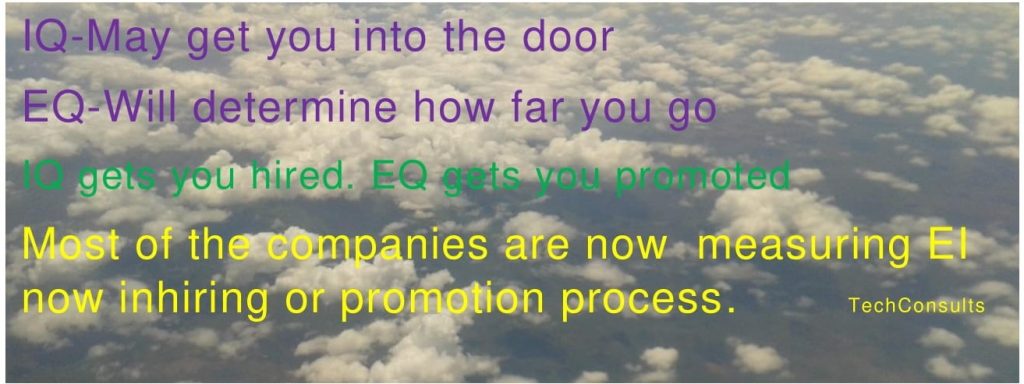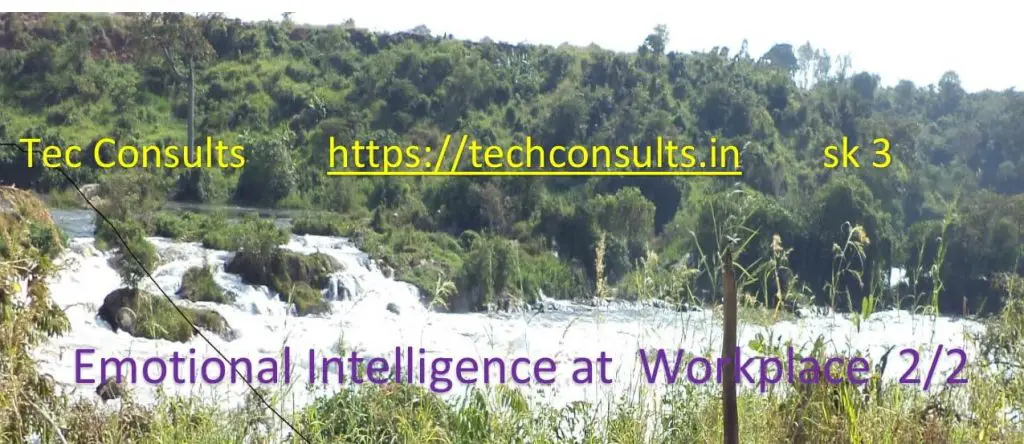
This is in continuation to blog Emotional Intelligence at Work place 1/2.a
Professionals require to follow Code of Ethics and Professional Conduct during there job performance and to carry forward the importance of Responsibility, Respect, Fairness and Honesty in the business operations. The application of Emotional Intelligence at work place shall help them in maintaining the Aspirational Standards associated with these four important sections of code.
This topic, the third in series, is related to important part of HR management and evolves around Intelligent Quotient (IQ), Emotional Intelligence (EI) / Emotional Quotient (EQ).
Please follow it with earlier blogs, named as below:
Workplace Environment
Emotional Intelligence at Workplace 1/2

SK-3: August 17, 2018 Blog TC-3
TOPICS
Emotional Intelligence (EI)
Skills of Emotional Intelligence
SWOT Analysis
Development of EI
It is more development of EI/EQ in individual’s personality matters than the development of IQ. Together IQ and EI/EQ are responsible for a successful outcome.
Qualities of EI people
Distorted Thinking
Conclusion
Summery
References
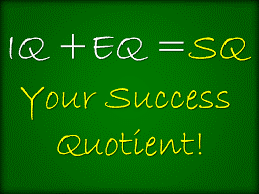
Do you want to be more successful in your operations a home and office, being in the present state of existence (Capacity and Capabilities)?
Yes, you can do. You only need desire, direction, dedication, and discipline to achieve more success in your existing environment.
It is by understanding Emotional Intelligence (EI) or Emotional Quotient (EQ)
Management of resources which also includes management of Human Resources (HR) is an important topic for managing any project. (A project can be defined as a set of inputs, tools and techniques, and outputs, used with necessary skills required by an individual or team to achieve a goal.)
Human capacities and capabilities for perfect output are developed through a better education, experience, and environment. One of the modern aspects is, to achieve greatness and perfection, using Emotional Intelligence (EI) or Emotional Quotient (EQ). It is beyond Intelligent Quotient (IQ). And these are the subjects related to human psychology. Endeavor is to give an idea about importance of EI/EQ so that more success is achieved by its user individual, team or organization.
Studies have shown that people with high EI have has better job performance, strong mental and leadership skills in comparison to the general intelligence -IQ.,
Initially suggested mixed model is shown aside with its attributes. The simplified four skill model for Self Competence and Social Competence is now in use, however it is an era of innovation, up-gradations are possibl.
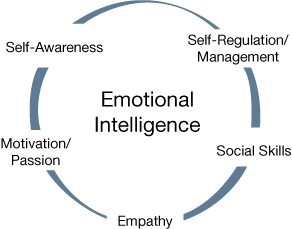
The process of transformation of wisdom (other’s experiences and suggestions in the form of books and quotes etcetera) and knowledge (your experiences associated with the individuals) education, and environment plays a great part in sustainable development in all sectors, for the benefit of society, and the nations – if they cross the international borders. The process utilizes the art and science imbibed in overall management but most important is the managing of human resources.
The management of any project in any field is mostly dependent on management of human resources and communication management.
There are many knowledge areas and processes in the project management and these can be customized according to the need of the project and its management requirements, but human resource management is of prime importance. The selection process of these resources in the past has been and even followed today was /is based on Intelligent Quotient (IQ).
I repeat the definitions of IQ and EI/EQ again as below:
In IQ the cognitive abilities are assessed through vocabulary reading, comprehension and mathematical and reasoning skills and assessment is based on the scores assigned to assess intelligence abilities and this practice exists even in higher educational competitions and is recommended in various private and government organization and also in the international transfers of human resources. (It is based more on objectivity)
In year 1985 emotional intelligence (EI, and also known as Emotional Quotient EQ) was advocated, but ultimately Daniel Goleman in 1995 made efforts for its better understanding and use.
EI/ EQ is individuals ability to identify, understand, evaluate control, and express emotions of self and others and groups. (It is based more on subjectivity) Together IQ and EQ provide success in practically all the fields.
When the kids go to the Play School they have social interactions with others and to remain in the group, they try to aware about their strengths and weakness and the strengths and weakness of other’s and try to remain in the social interaction with some adjustments within the limits of age and environment. This is EI/EQ. As they go to higher classes their ability is judged more because of their scores. Their travel path changes from EI/EQ to more towards IQ and this should be avoided.
Know that
More than twenty percent of companies are now measuring EQ/EI in the hiring or production process.
IQ gets you hired- Eq gets you promoted
Research indicates that technical skills account for less than 15% of one’s values in obtaining, keeping or advancing in a job. More than 85% of job success is based on personal conduct and the ability to put other at ease. Almost 100% of education dollars go to teach facts and figures which account for only 15% of success in work!
(An extract from Harvard business operations unit)
EI/EQ helps in the development of individuals, in the development of team and in the development of leadership which ultimately enhances the organizational development
In today’s environment getting the work done at workplace along with living with people in collaborative manner is very necessary and as such IQ need to be supported by EQ/EI for overall success.
We know that that the workforce at work places is appointed at the same time with same qualifications for a particular field.
But why some of them advance in careers leaving the others behind?
Why some are successful, and some are not?
It is not the IQ that matters in such cases, but it is EI/EQ development that matters.
Cognitive intelligence is the ability to understand information, imagine possibilities, use intuition, solve problems, and make decisions.
What Is Emotional Intelligence?
Emotional intelligence is the ability to understand the needs and feelings of oneself and other people, manage one’s feelings, and respond to others in appropriate ways.
The four major skills of EI/EQ model are given in the table below along with the further description
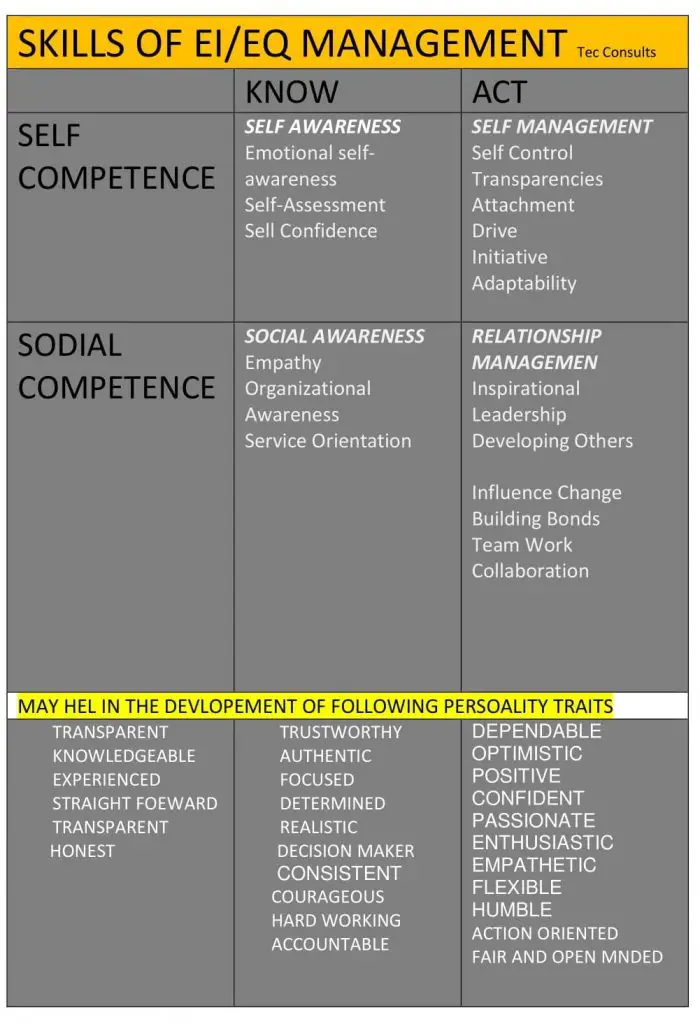
The four skills as shown above have other sub attributes as follows:
Self-Awareness
1) Emotional Self-Awareness
2) Self-Assessment
3) Self-Confidence
All of the three traits can be assessed by SWOT (strength, weakness, opportunities and threats for self-analysis) analysis and action on the analysis outcome
SWOT Analysis is a useful technique for understanding your Strengths and Weaknesses, and for identifying both the Opportunities open to you and the Threats you face. This analysis can be done in different work environments (from home to office- all jobs)
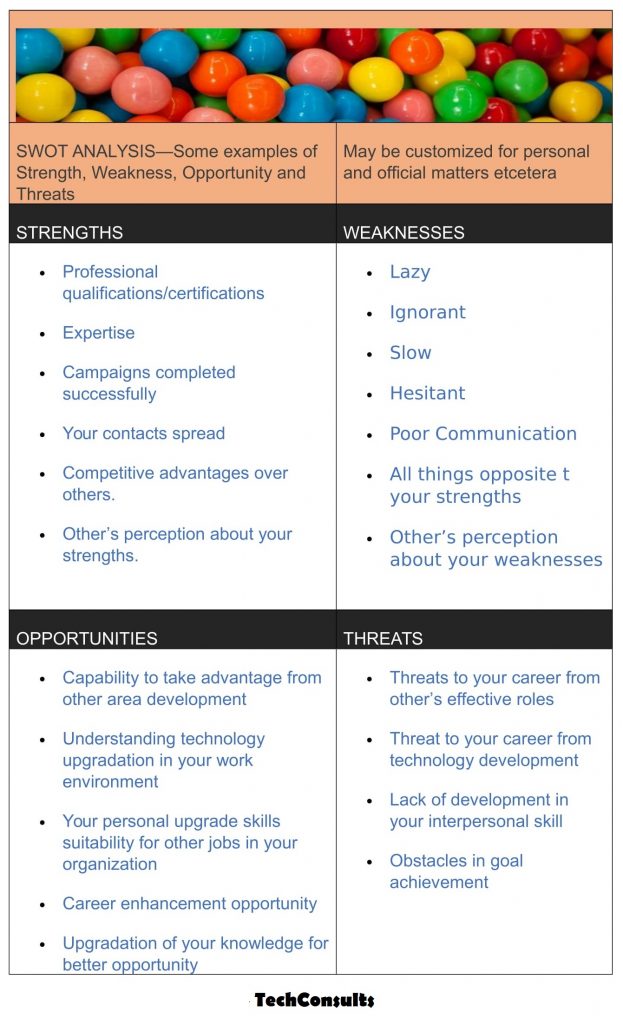
Self-Management
1) Emotional Self-Control: About any action you may have very bad feelings initially, but instead of acting on your feelings you keep calm by controlling your feelings and then within your calm state you tell about the incidence what is the correct way to a solution on the basis of a valid reason.
2) Achievement
3) Initiative
4)Transparency
5) Adaptability: an ability to change something or oneself to fit to occurring changes without being in pressure or in state of agitation.
6) Optimism: being optimistic-looking towards the bright side of a happening.
Social Awareness
1) Empathy: A more advanced state of understanding emotions beyond sympathy- an action after understanding the feelings of each other by heart.
2) Service Orientation
3) Organizational Awareness– a high level understanding of the organization will help in better understanding with your junior and seniors.
Relationship Management
1) Inspirational Leadership
2) Influence
3) Conflict Management
4) Change Catalyst
5) Developing Others
6) Teamwork
7) Collaboration- is the process of two or more people or organizations working together to complete a task or achieve a goal by understanding the feelings of each other.
Stay cool Like cool captain.
Be Honest
Maintain Fairness
Be assertive

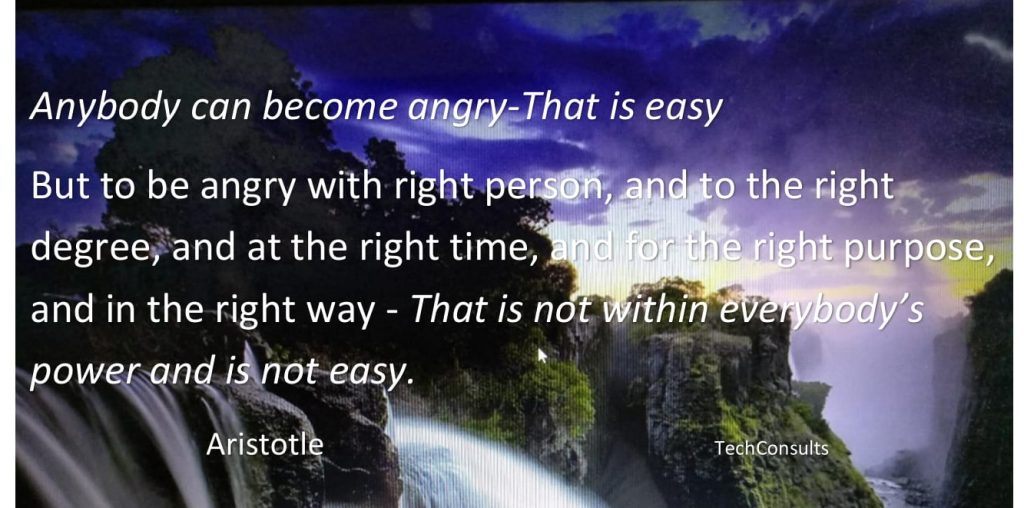
Avid anger
Be responsible
Have ability to explain adverse situations.
Some qualities of Emotionally Intelligent people
They are clear about their life purpose and values
They cultivate self-awareness
They show empathy
They focus on the positive
They are great listeners
They are stress resistant
They keep good company and encourage others
They are not the part of distorted thinking process and think sensibly
Emotionally Intelligent persons can have a better use and output from follow up of Aspirational Standards of Honesty, Fairness, Respect, and Responsibility
(Please follow my blog 4, next to come, on Social and p-Professional Responsibility)
People with developed Emotional Intelligence do not have distorted thinking. Some aspects of distorted thinking process are given below:
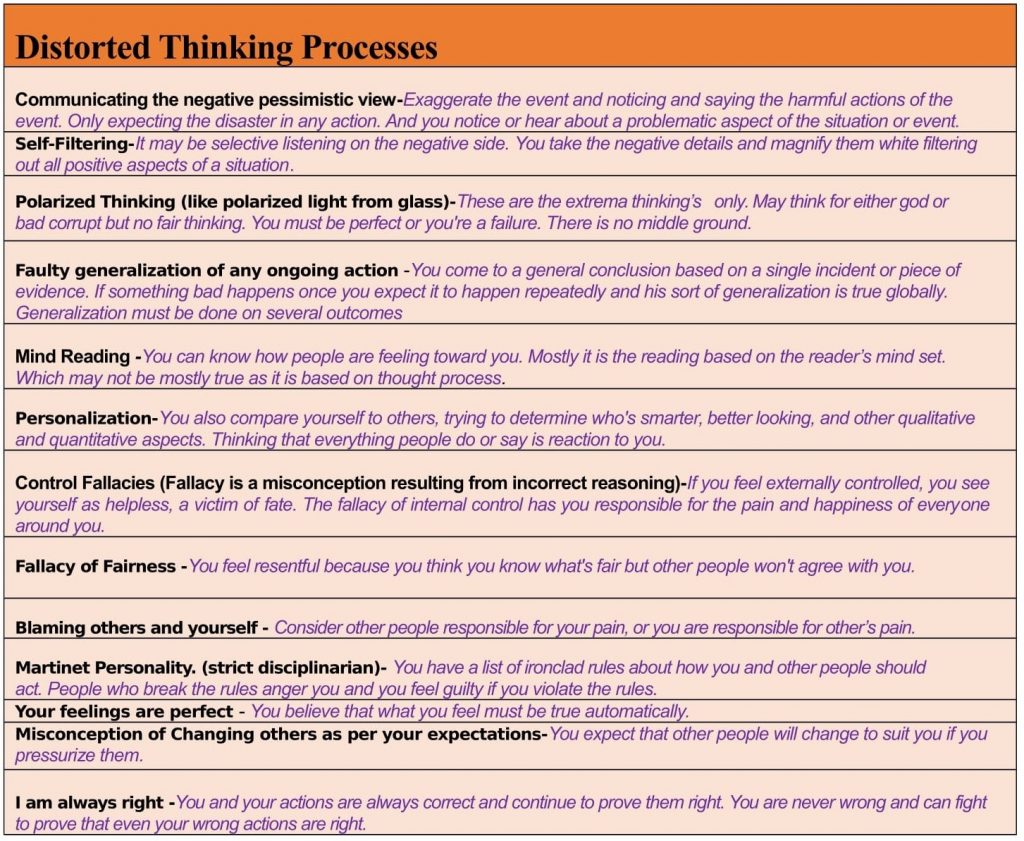
Try this:
It isn’t stress that makes us fall. It’s how we respond to stressful events.
No one cares how much you know, until they know how much you care. —Theodore Roosevelt
Interpersonal skills for project managers
These skills are very important to master by project managers. To every action there is a reaction. Wait for some time before reacting as your quality of reaction depends on to whom and what you are listening. Your reaction must start after proper listening. Some of the required intern personal skills are given in brief as below:as
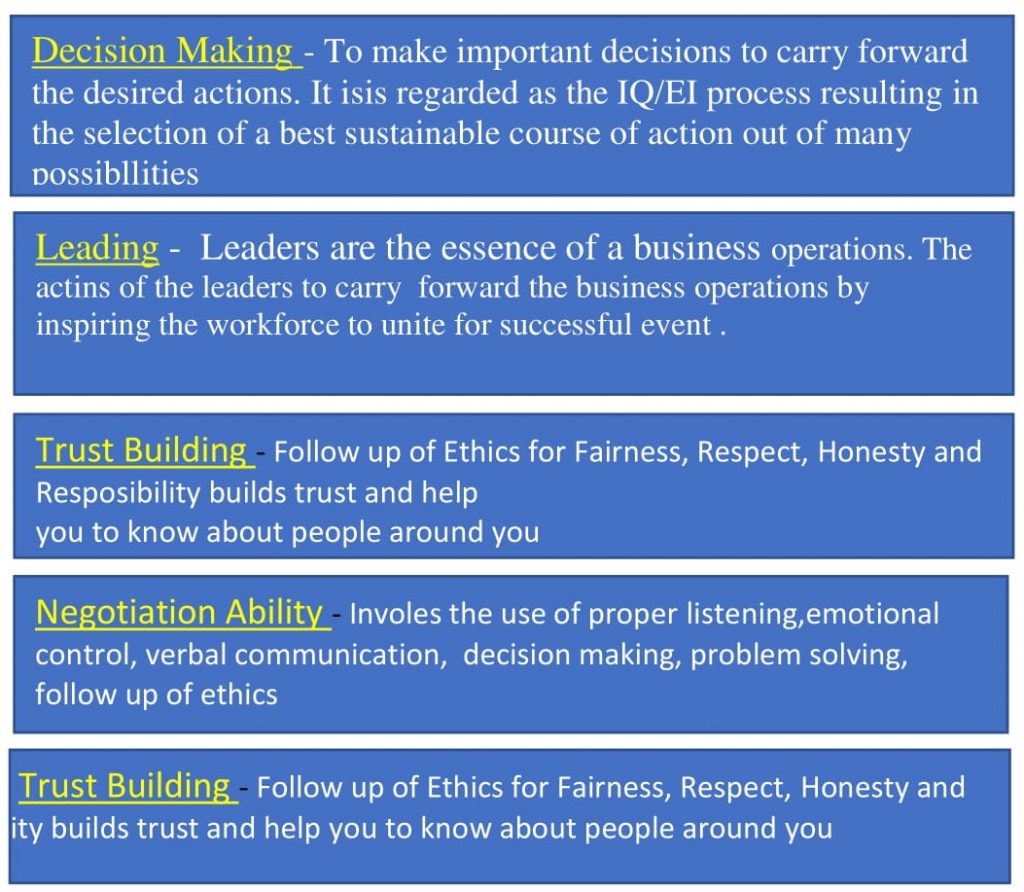
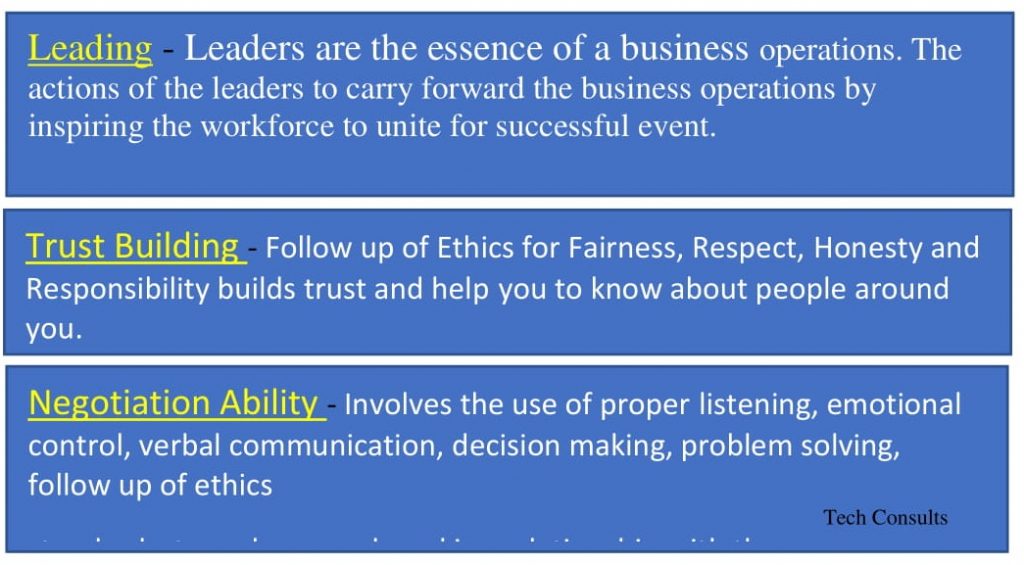
Concluding Remark
IQ and EI/EQ, both are necessary. It is EQ/EI that Matters more. Higher the EQ more shall be success. You need a desire, direction, dedication and discipline to cultivate EI/EQ. Man is physically ill-equipped, but it has the thinking ability and so different from other species. Successful people do small things in great way. Every failure boosts them for their efforts to achieve success. The chicken must struggle itself from coming out of the egg and does not get any support, and if it comes out with others help it is not likely to survive. Struggle is must for success. IN the last 30 years before Abraham Lincoln became president of United States of America, passed through the phase of nervous breakdown, defeats in eight elections, failure in business twice but ultimately became well known president of United State of America.
Summery
IO is being used since long for problem solving etcetera, but some one’s ability if explored and developed and used shall provide more success. Emotional intelligence- EI)
This fact, along with others, was finally highlighted by Daniel Goleman in his book on Emotional Intelligence mentioning why it matters more than IQ in 1995.
The Goleman model as discussed consists of five domains separated in four competencies. In brief it suggests that first it is self-awareness self-motivation and self-management then one can better manage the other people in social circle or at work place.
You may be handsome or beautiful but remember these are skin deep. The quality of your spoken word, deeds and thought matters most in any workplace specially with children and downtrodden. You can resolve any conflict in the world if you follow the conflict management process. You must know yourself, manage yourself, know others- only then you can find no problems. Emotional Intelligence is a solution provider.
